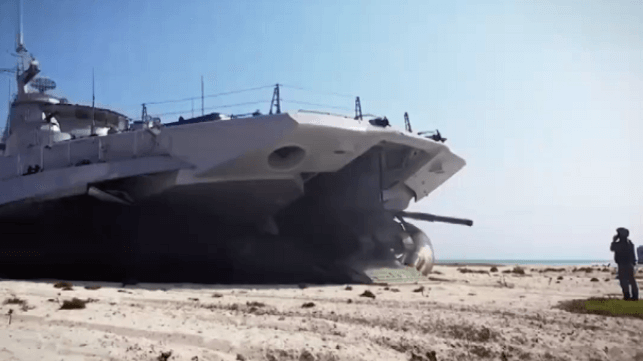Top U.S. Officer Warns That China is Rehearsing Plans to Take Over Taiwan

China is conducting drills that simulate the reunification of Taiwan by force, according to the U.S. military's top officer in Asia. China's navy and air force routinely operate in the Taiwan Strait and on the eastern side of the island, often during periods of elevated tension; at a conference in Hawaii last week, Indo-Pacific Command chief Adm. Sam Paparo suggested that these drills are rehearsals for the main event.
"[China's] aggressive maneuvers around Taiwan right now are not exercises, as they call them. They are rehearsals," Adm. Paparo said. "They are rehearsals for the forced unification of Taiwan to the mainland."
Paparo called for a radical acceleration of efforts to rearm, starting with "procurement at the speed of combat, not at the speed of committees." He noted that ongoing conflicts in the Mideast and Ukraine have eaten into available stocks of munitions that will be needed in a the high-end fight with China, adding more pressure to find ways to rebuild America's arsenal. He predicted a major role for AI, and for 3D print-on-demand parts. "It isn't future tech, it's current capability," he noted.
On the other side of the Pacific, as Paparo spoke, China's forces were on the move. From January 28 through February 12, China's Eastern Theater Command carried out combat patrols around Taiwan, deploying surface combatants, fighters and bombers. The drills overlapped with the transit of a U.S. Navy destroyer and an MSC auxiliary survey ship through the Taiwan Strait: From Feb. 10-12, the destroyer USS Ralph Johnson and the USNS Bowditch made their way south through the strait, completing the first U.S. Navy transit of the waterway since the beginning of the new administration. Taiwan Strait transits are intended to challenge China's claim to control over the full 80-mile width of the strait, most of which falls outside of the limits of China's territorial seas.
The Canadian warship HMCS Ottawa followed suit with a similar transit over the weekend. China objected strenuously, and the People's Liberation Army carried out a large-scale exercise with nine ships and more than 40 aircraft around Taiwan on Monday.
Taiwan's defense ministry pushed back in a strongly-worded statement. "The Taiwan Strait is absolutely not within the scope of China’s sovereignty," Taiwan's defense ministry said in a statement. "Peace and stability in the Taiwan Strait is not only a matter of concern for Taiwan, but also a common concern for free and democratic countries around the world."
In the South China Sea, the China Coast Guard sent a patrol to within 35 nautical miles of Palawan, outside of Philippine territorial seas but much closer to the nation's home islands than normal. An unusual three-ship CCG task force made the journey - at about the same time that Philippine diplomats were traveling to Munich for a high-level international security dialogue, including discussions of the tensions in the Spratly Islands.
"Usually, they [the China Coast Guard] go sort of one or maybe two at a time, so taking three ships is sending a particular message of strength," maritime security analyst Ray Powell told GMA.
In Munich last weekend, former Chinese vice foreign minister Fu Ying made clear that China would not allow continued Philippine control of Second Thomas Shoal and Sabina Shoal, two reefs located within the Philippine exclusive economic zone. For 25 years, the Philippine military has maintained a garrison on a decaying shipwreck on Second Thomas Shoal, and China has demanded that Manila must remove Philippine forces from Philippine waters.

that matters most
Get the latest maritime news delivered to your inbox daily.
"If the Philippines can take new rocks, how can you stop others? . . . That’s a red line no one should be allowed to cross," former vice foreign minister Fu said. "How can you stop China from taking more? We’re capable, there’s no problem, but we are exercising constraint."
In a rebuttal, Philippine foreign secretary Enrique Manalo said that when China "applies its own domestic laws to certain areas within our exclusive economic zone, then it really does create the kind of tension that we have been experiencing."
